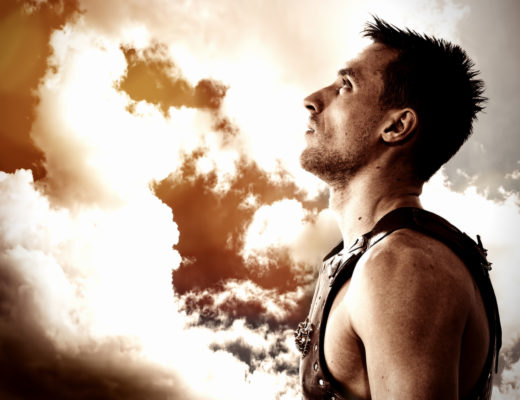According to famed scholar Joseph Campbell, the archetypal story of the hero on a journey explores themes and dilemmas that more deeply signify the spiritual challenges that we face throughout life. Challenges that are necessary to our personal growth.
These tales have been told for as long as we have told stories, and have their roots in ancient times. Most celebrated, perhaps, may be Homer’s great saga ‘The Odyssey’ (see ‘The Treasure in Transformation’)
For Joseph Campbell, the archetypal hero’s journey can be read as an astonishing roadmap for personal transformation. And it can guide you and ground you through a big process of change.
Joseph Campbell’s roadmap
Campbell’s research found 17 separate stages to the hero’s journey, each stage expressing a different dilemma. They include the ‘call to adventure’, the ‘road of trials’, and the ‘return with new wisdom’.
What follows is a brief introduction to some of these stages. They are loosely categorised into 3 sections—departure, initiation and return of the hero.
As you read on, take note of what most resonates with your own experience and how it may support and guide you. Please note that not every time of change has every stage, that stages can recur, and these are metaphorical guidelines rather than literal steps.
The Hero’s Journey
Departure stages
- the call to adventure – the call is something you sense with your intuition. You might think of it as listening to your heart, or an inner knowing.
- Sometimes the call is triggered by a life event, and sometimes by an inner desire to grow and move on from the way things have been.
- The motive of a call to adventure is to seek more life, even if that requires endings. Goals can include fresh purpose, honesty, fulfillment, creativity, meaningfulness, or simply to do what must be done.
- The call to adventure may come as an impulse to “follow your bliss”, which is Campbell’s mantra for a meaningful life.
- a refusal of the call – why refuse? Because change is scary.
- According to scholar Keiron Le Grice (author of The Rebirth of the Hero ) there are numerous reasons why you might refuse the call; perhaps because your desired path is irrational, it upsets others, fear of the unknown, a conflict of duties, unwillingness to deal with the burden of responsibility, and the discomfort of change.
- To act upon the call, you must defy the status quo that your ego finds comfortable. As this takes courage you need to discover the ‘hero’ within yourself. I offer guided meditations in a Heart’s Plan session to help you find that part of you.
- meeting the mentor – this might be someone else and/or a wise part of you that can help you say ‘yes’ to the call.
- Think of Ben Kenobi, the mentor of Luke Skywalker. Who do you have in your corner as mentor?
- Can you find inside yourself the strength and wisdom that you need? There are mindfulness practices, such as this one by Rick Hansen, that can assist you with this. You need to find enough inner confidence and willpower to help you leap into the unknown.
- Help can also appear in the magical form of synchronicities (meaningful coincidences) that confirm for you that you are on the right path.

- crossing the threshold – this involves facing the ‘guardian of the threshold’. The guardian may be, metaphorically speaking, a dragon, or monster, or some terrible obstacle that wants to drive you back or make you lose hope. Crossing the threshold means confronting the thing that daunts you.
- Given the weight of this challenge, moving forward requires doing some inner work. This can feel like ‘going down into the underworld’ as you explore the darkness and the unknown of both yourself and a new situation. It also requires the courage to confront fear, because once you cross the threshold you have reached a point of no return.
- Campbell explores the story of Jonah and the whale as being symbolic of a departure from known and comfortable circumstances that is not consciously chosen. Jonah, the hero, is swallowed up by something out of his control and must thereafter transit within the dark world of the whale’s belly until the whale is ready to spit him out onto new land.
Initiation stages
- trials and tests – after crossing the threshold there is a long sequence of challenges that the hero must face in order to return home with new wisdom. This is sometimes called the road of trials.
- Dragons or monsters may need slaying or mountains to be climbed. We will be tested to stay the course. Not once, but again and again. As spiritual teacher Lisa Rankin puts it, the hero’s journey “is an initiation, which means it won’t always be roses and violets.”
- The road of trials requires patience and mental toughness. Fears, worries, and doubts will arise.
- Rankin also explains how during this time it can be hard to know whether you have taken a wrong turn or are being toughened up for the road ahead.
- The road of trials offers persistent challenges, but is also rich with many other types of experience. There may be small victories, new realisations and knowledge, the temptations of escape, and encounters with what Campbell symbolically describes as the goddess (love) and the father (that which has power over you). The exact nature of your joys and struggles will be unique to your journey.
- the ordeal – some journeys involve an ultimate ordeal. This is an intense experience that can feel like a trial by fire or a final fight with that which must be overcome.
- To get a better idea, think the late stages of labour when giving birth.
- Or perhaps a ‘dark night of the soul’.
- The final ordeal is a spiritual death and rebirth experience. It forces change but bears the seeds of a new phase of life.
- Such an experience deeply transforms you; you are different than before.

- the return – the end of the journey involves returning to ordinary life as the person you have now become.
- Perhaps something in opposition inside of you has become reconciled. There is a new centre. Some fulfillment. A realisation.
- At best you are wiser, more enlightened or whole. More aligned with your authentic self, more responsive to your inner world.
- This is your reward, your achievement. This is the treasure won from the hero’s adventure.
- Transformed by the ordeal the hero must now return to normal life.
- According to Keiron Le Grice, the return to everyday life may be something you choose, or it might be forced upon you by the practical necessities of living.
Return stages
- returning with new wisdom – the bounty you have won from the struggles of your journey might be any variation of personal growth or transformation. Perhaps new insights about yourself and life, the recognition or development of a personal gift or strength, enhanced self-awareness or self-acceptance, a more expansive identity, more confidence or courage or joy or peace, the resolution of an inner conflict . . .. there are many possibilities.
- How to come back to ordinary life after the intensity of a rite of passage? This may feel like the final challenge. Resistance, negativity, doubt about the return can be part of the journey.
- Returning when the time is right, says Le Grice, helps “to restore a balance to life after a period of inner reorientation”.
- Sharing your wisdom – Now the purpose of your rite of passage comes to life.
- You are grown and transformed. It’s a new you.
- You can draw upon what you have learned to shape how you now live.
- It becomes possible to help others too, what you’ve learned might not just benefit you.

To learn more
If you are curious to learn more about the hero’s journey, there are wonderful resources that can help you.
For deep divers, I recommend Joseph Campbells original classic ‘Hero with a Thousand Faces’ and ‘The Rebirth of the Hero’ by teacher and writer Keiron Le Grice.
There are also articles online that can be fun and insightful. You might enjoy, for example, Lisa Rankin’s personal tale in the ‘The Hero’s Journey of Finding Your Calling.’
Growing beyond your edge
The symbols and stages of the hero’s quest are a roadmap of personal growth. It’s a roadmap that can guide you through times of change, rites of passage, and big turning points on your life journey.
It charts the territory of personal transformation, and what I often describe as ‘growing beyond your edge’. As you grow beyond the edge of who you have been, your sense of who you are expands and evolves.
Growing beyond an edge that no longer serves you makes you able to live out more of your innate potential.
Think of this as becoming more whole or living more fully your heart’s plan. For psychiatrist Carl Jung, it is the difference between a life wasted and one lived well.
“In the final analysis, we count for something only because of the essential we embody, and if we do not embody that, life is wasted.’ – C. G. Jung
Copyright © 2020 Heart’s Plan, All rights reserved




